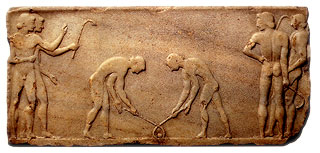The Olympic Games originated long ago in ancient Greece. Exactly when the Games were first held and what circumstances led to their creation is uncertain. We do know, however, that the Games were a direct outgrowth of the values and beliefs of Greek society. The Greeks idealized physical fitness and mental discipline, and they believed that excellence in those areas honored Zeus, the greatest of all their gods. One legend about the origin of the Olympic Games revolves around Zeus. It was said Zeus once fought his father, Kronos, for control of the world. They battled atop a mountain that overlooked a valley in southwestern Greece. After Zeus defeated his father, a temple and immense statue were built in the valley below to honor him. This valley was called Olympia, and soon religious festivals developed there as people came to worship Zeus and to approach as nearly as possible his great strength. It is believed that these religious festivals eventually led to the famed Games of the Olympics. Athletic competition became so important to the Greeks that the Olympic festivals were a peaceful influence on the warlike city-states. Sparta was famous for the strict military training of its citizens. But it would wait until the Games were over before sending fighters into battle. Other cities followed this example. For the first 13 Olympic Games, the only event was the one-stade run. But over the years, new sports were added to the Games. The hoplitodrome, for instance, was a footrace the athletes ran wearing full armor. The pentathlon, in which the athletes competed in five events (jumping, javelin, sprint, discus, and wrestling) was added to the Games in 708 B.C. The pancration was introduced in 648 B.C. This brutal sport had no rules and combined boxing and wrestling. A winner was named only when one man raised his hand in defeat or lay unconscious on the ground. In addition to the pre-existing religious shrines and altars, a vast complex of buildings and structures was constructed at Olympia to accommodate the growing number of sports and athletes. Chariot races, first run in 680 B.C. , were held in the hippodrome. Boxers and wrestlers trained in the Palaestra, which was adjacent to the gymnasium. The Leonidaion housed the athletes. Generally, only freeborn men and boys could take part in the Olympic Games (servants and slaves were allowed to participate only in the horse races). Women were forbidden, on penalty of death, even to see the Games. In 396 B.C. , however, a woman from Rhodes successfully defied the death penalty. When her husband died, she continued the training of their son, a boxer. She attended the Games disguised as a man and was not recognized until she shouted with joy over her son’s victory. Her life was spared because of the special circumstances and the fact that her father and brothers had been Olympians. – The Decline of the Games – After Rome conquered Greece in the 100′s B.C. , Olympic standards began to decline. Competition for the common good was ignored by the glory hunters, who were willing to use any trick or deceit to win. For instance, in A.D. 67 the emperor Nero brought his own cheering section and competed in events himself. Even though he fell from his chariot during the race, he was named the champion. In A.D. 394 the Roman emperor Theodosius I, a Christian who considered the Games a pagan festival, ordered them stopped. Olympia then began to crumble. The great statue of Zeus was taken away to Constantinople, where it was destroyed in a fire. In 426, Roman emperor Theodosius II ordered all the temples destroyed. Earthquakes later helped finish what human hands had started, as well as flooding caused by a change in the course of the river that flowed through Olympia. The once-great city was eventually buried. In 1829, German archaeologists began uncovering Olympia. Today, the site of the ancient Olympic Games is only a shadow of its former glory. Many of the building foundations remain, but few walls and pillars still stand, and the stadium where footraces were held long ago is now just a broad stretch of barren ground.
Denis Mavromichalis
Christos Vasiliou


